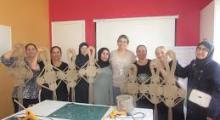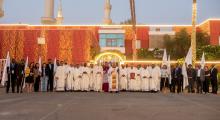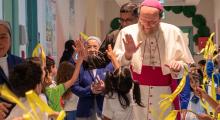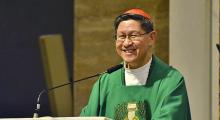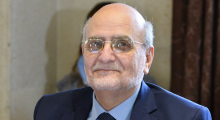Issued by the Catholic Center for Studies and Media - Jordan. Editor-in-chief Fr. Rif'at Bader - موقع أبونا abouna.org
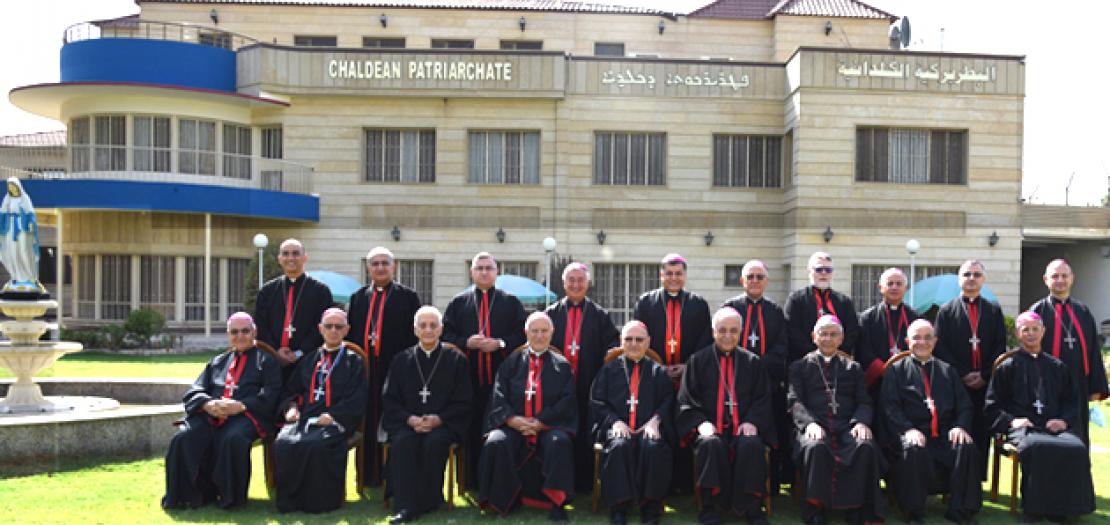
His Beatitude Cardinal Louis Raphael Sako inaugurated the works of the Synod of the Chaldean Catholic Church in the patriarchal residence in Al-Mansour, Baghdad, on the morning of Monday, 9 August 2021.
His Beatitude began the session by praying to the Holy Spirit, followed by remarks in which he touched upon the most important events and challenges facing the Chaldean Church at home and abroad. He stressed the importance of sound and sustainable formation of the clergy, and the selection of bishops according to canonical criteria so that the right person may serve the right place. He also focused on the importance of liturgical renewal and appropriate religious education programs that are suitable for people’s culture and their current circumstances.
The Patriarch also took time to reflect on Pope Francis’ visit to Iraq on March 5-8, 2021. The visit gave [Iraq and its people] a boost of hope for a better future. Certainly, from these pains, hopes are born. In his speech, the Patriarch remarked: “We must study carefully the situation of Christians who have been subjugated to many pressures, and due to the increasing immigration, our numbers have declined. The Church should not play a partisan political role, but rather work, with apostolic courage and responsibility, to enlighten consciences on issues of peace and social justice, good citizenship, and immigration due to despair. The mission of the Church is also the voice needed to sow the seeds of brotherhood, love, reconciliation, peace, security, solidarity, cooperation, and social justice. It is important to strengthen the presence of our Church in Iraq, because of the land, language, history and heritage.”
At the end of the first session, the Synod Fathers sent a letter to Pope Francis asking for his prayers and blessings for the Synod and thanking him for his historic visit to Iraq.
Then His Beatitude reviewed the topics on the agenda:
1. Selection of bishops for vacant dioceses.
The Synodal Fathers chose a Bishop for the Diocese of Canada, another for the Diocese of Dohuk, and an Auxiliary Bishop for the Diocese of Alqosh, and coadjutor (with the right of succession). As for the other dioceses whose bishops had submitted their resignation, due to reaching the canonical age of retirement, the Fathers chose to delay the election of a new bishop due to the circumstances and difficulties and considered it safer to extend their stay for another year. They are Archbishop Ramzi Garmo, Archbishop of Diyarbakir (Turkey), who was released from the responsibility of the Archdiocese of Tehran (Iran), Archbishop Toma Meram, Archbishop of Urmia, in addition to his appointment as patriarchal administrator of the Archdiocese of Tehran, and Archbishop Antoine Audo, Archbishop of Aleppo (Syria). The Synod Fathers also appointed Bishop Bawai Soro, who recently retired for health reasons, as the head of the Committee for the Laity replacing Bishop Robert Jirjis. He was also appointed as the head of the Committee for the Family.
2. Liturgical matters:
The bishops stressed the importance of adhering to the decisions of the synod, which represent unity and ecclesial communion between dioceses.
Feast Days: The Synod Fathers decided to restore the feast of St. Joseph on March 19, as well as the feast of the apostles Peter and Paul on June 29 (while following the prescribed liturgical prayers of these two feasts), and the memorials and seasons remain as they are fixed in the calendar. The Feast of the Circumcision of Jesus on January 1 was replaced by the World Day of Peace.
As for the liturgical readings, the Fathers adopted the book “Our Liturgical Life” for Sundays and Feasts which the Patriarchate had printed in Arabic for the odd year, and Bishop Robert Jirjis was asked to prepare another volume for the even year. Everyone agreed to reprint the book of daily readings prepared by the Patriarchate. As for the dioceses that use the Surath or the English language, the responsibility for translation is left to the bishop of the diocese.
Organizing the celebration of the Mass, the freedom is left to the celebrant, whether he is a bishop or a priest, to choose one of the proved Anaphoras of the Mass: The Anaphora of Addai and Mari, the Second Anaphora, the Third Anaphora, and the Anaphora of St. Thomas. The Fathers stressed that the liturgy should be well prepared for the celebration revealing a Divine Presence. This is accomplished, but not limited to, the church’s decoration, the priest’s and servers’ vestments, the hymns and music, and the homily which should not exceed ten minutes.
The priest’s stole is standard with two parallel extensions symbolizing the human and divine natures of Christ. Instead of a cincture, a belt should be used as a symbol of the unity of the two natures of the one divine person.
3. The Causes for the beatification of the martyrs
Bishop Francis Kalabat explained the process of the beatification of our martyrs and stated that there should be proclamations within the near future.
4. Restoration of the role of women servers
Women servers had a role in the church service. His Beatitude the Patriarch encouraged the restoration of their role in serving the liturgy with deacons, as well as Christian teaching and charitable service (charity works). He presented a ritual rite borrowed from the ancient rite to bless them, but it is not binding for every bishop can prepare a rite. The Fathers also dealt with the topic of “consecrated men and women” and a return to the distinctiveness of our Church in the daughters and sons of the Covenant.
5. The role of the laity
The laity were unable to participate in this year’s Synod due to the Corona pandemic, but the Committee of the Laity thankfully submitted a detailed report on its activities and the Fathers requested that the Committee continue its work in preparation for the Conference of the Laity to be held in 2022.
6. Synodality
On the topic of Synodality, His Beatitude requested that each Bishop, along with his priests, present proposals to the Patriarchate.
7. Chaldean Solidarity Fund
The establishment of the Chaldean Solidarity Fund designed to help the needy parishes, especially in the wake of the Corona pandemic and the decline in the global economic situation. The bishops expressed their desire to be in solidarity with the needy dioceses and help them.
8. Center for Manuscripts and culture
The responsibility was entrusted to Bishop Mikhail Najib for the purpose of preparing a detailed study of the project.
9. Naming the Patriarchate
After discussion and deliberation, the Fathers unanimously agreed to adopt the name “Chaldean Patriarchate” instead of the Patriarchate of Babylon over the Chaldeans, and they enthusiastically expressed their pride in their Chaldean identity.
10. Official Visits
On Saturday, August 14, 2021, the fathers visited His Excellency the President of the Republic, Dr. Barham Salih in the morning, and then they visited Prime Minister Mustafa Al-Kadhemi in the afternoon.


